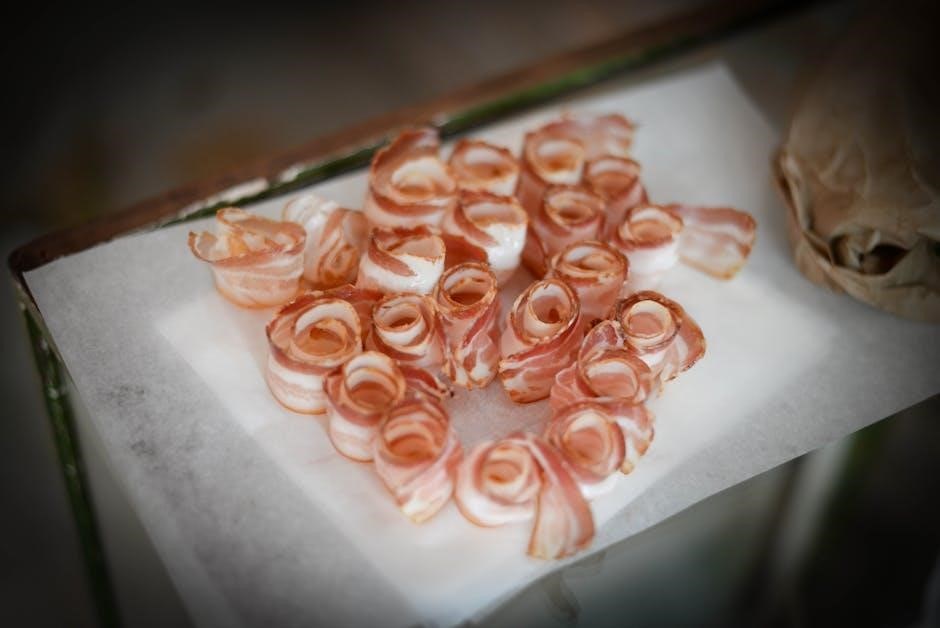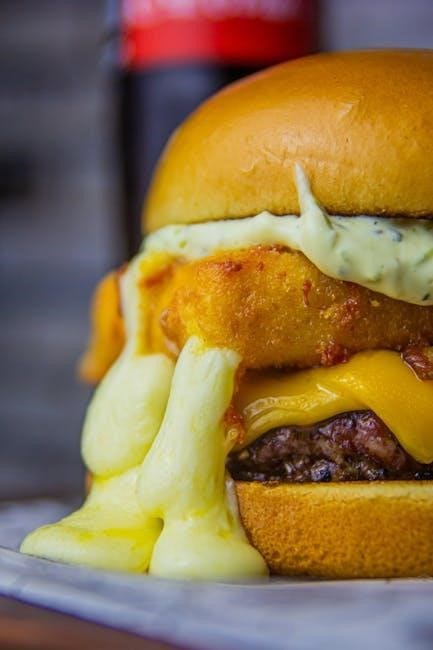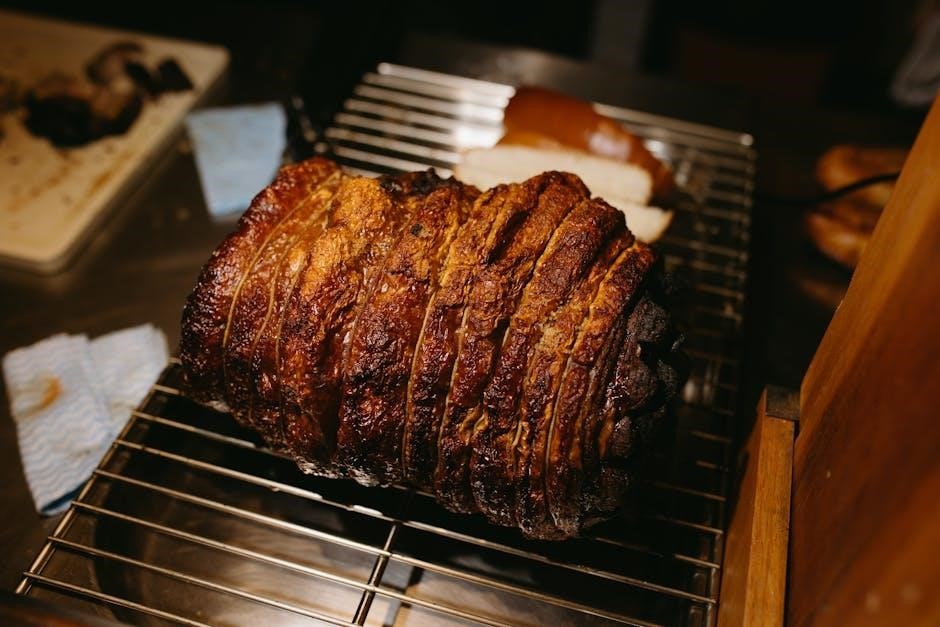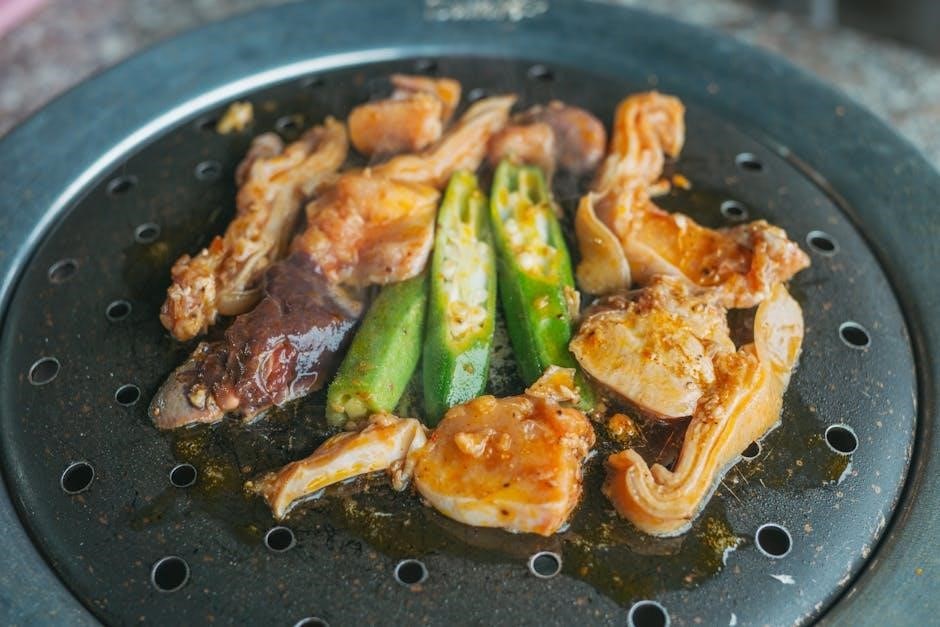Understanding Fatty Liver Disease and the Importance of Diet
Fatty liver disease occurs when excess fat builds up in the liver‚ potentially causing inflammation; A well-balanced diet plays a crucial role in managing the condition‚ reducing fat accumulation‚ and promoting liver health.
Overview of Non-Alcoholic Fatty Liver Disease (NAFLD)
Non-Alcoholic Fatty Liver Disease (NAFLD) is the most common chronic liver condition‚ characterized by excess fat accumulation in liver cells without heavy alcohol consumption. It is strongly linked to obesity‚ insulin resistance‚ and metabolic syndrome. NAFLD can progress from simple steatosis (fat buildup) to non-alcoholic steatohepatitis (NASH)‚ fibrosis‚ cirrhosis‚ and even liver failure. Risk factors include obesity‚ type 2 diabetes‚ high cholesterol‚ and genetic predisposition. Early intervention through diet and lifestyle changes can reverse early stages of NAFLD‚ making it essential to adopt a liver-friendly diet. Understanding NAFLD is crucial for implementing effective dietary strategies to manage and potentially reverse the condition.
The Role of Nutrition in Managing Fatty Liver
Nutrition plays a pivotal role in managing fatty liver disease by reducing liver fat and inflammation. A balanced diet focuses on whole‚ unprocessed foods‚ high in fiber‚ lean proteins‚ and healthy fats‚ while minimizing refined carbs and sugars. Incorporating Mediterranean diet elements‚ such as olive oil‚ vegetables‚ and omega-3-rich foods‚ supports liver health. Proper hydration and low-glycemic fruits also contribute to reducing fat accumulation. Avoiding alcohol‚ processed meats‚ and high-fat foods is crucial. A structured meal plan helps maintain these dietary changes‚ promoting weight loss and improving metabolic health. By adhering to a nutrient-conscious diet‚ individuals can effectively manage fatty liver and potentially reverse early stages of the disease;
Key Principles of a Fatty Liver Meal Plan
Focus on whole‚ unprocessed foods‚ high-fiber vegetables‚ lean proteins‚ and healthy fats. Incorporate low-glycemic fruits and stay hydrated. Avoid refined carbs‚ sugars‚ and processed foods to support liver health and weight management.
Focus on Whole‚ Unprocessed Foods
Prioritizing whole‚ unprocessed foods is essential for managing fatty liver disease. These foods provide essential nutrients‚ vitamins‚ and fiber while minimizing harmful additives. Incorporate vegetables‚ whole grains‚ lean proteins‚ and healthy fats like avocado and nuts. Avoid refined carbohydrates‚ such as white bread and pasta‚ which can increase liver fat. Opt for fresh fruits‚ legumes‚ and whole-grain products to support liver health and reduce inflammation. By focusing on natural‚ unprocessed ingredients‚ you create a foundation for a balanced diet that promotes fat reduction and overall well-being.
Incorporating Fiber-Rich Vegetables and Legumes
Fiber-rich vegetables and legumes are vital for managing fatty liver disease. They improve digestion‚ regulate blood sugar‚ and reduce fat accumulation in the liver. Include leafy greens like spinach‚ broccoli‚ and Brussels sprouts‚ as well as legumes such as lentils‚ chickpeas‚ and black beans. These foods are high in fiber‚ which helps control hunger and supports weight management. A diet rich in fiber also promotes the elimination of toxins‚ enhancing liver function. Aim to incorporate a variety of colorful vegetables and legumes into your meals to create balanced‚ nutritious dishes that support liver health and overall well-being.
Healthy Fats and Lean Protein Sources
Healthy fats and lean proteins are essential in a fatty liver meal plan. Avocados‚ olive oil‚ nuts‚ and fatty fish like salmon provide omega-3 fatty acids‚ which reduce inflammation. Lean proteins such as chicken‚ turkey‚ and plant-based options like tofu and legumes support liver function without adding excess fat. These foods help balance blood sugar and promote a healthy weight‚ reducing liver fat accumulation. Incorporating these into meals aids in managing fatty liver disease effectively‚ supporting overall liver health and reducing inflammation.
Hydration and Low Glycemic Fruits
Staying hydrated is crucial for liver health‚ as water helps flush out toxins. Incorporate herbal teas and water-rich foods like cucumbers and melons. Low glycemic fruits‚ such as berries‚ apples‚ and citrus‚ are ideal as they stabilize blood sugar levels. These fruits are rich in antioxidants and fiber‚ which support digestion and reduce inflammation. Avoid high-sugar fruits like mangoes and grapes‚ as they can worsen liver fat accumulation. Pairing fruits with lean proteins or healthy fats can further regulate blood sugar spikes. Proper hydration and mindful fruit choices are key to managing fatty liver disease and promoting overall well-being.
Sample 7-Day Fatty Liver Meal Plan
A 7-day fatty liver meal plan focuses on whole‚ unprocessed foods‚ lean proteins‚ and healthy fats while avoiding refined carbs and processed meats.
Breakfast‚ Lunch‚ and Dinner Ideas

Start your day with a nutrient-rich breakfast like oatmeal topped with berries and nuts or scrambled eggs with spinach. For lunch‚ opt for grilled chicken or fish paired with quinoa and steamed vegetables. Dinner ideas include baked salmon with asparagus or lentil soup with whole-grain bread. Incorporate fiber-rich options like chia pudding or avocado toast. Focus on lean proteins‚ healthy fats‚ and colorful vegetables to support liver health. Avoid sugary drinks and refined carbs. Staying hydrated with water or herbal teas is also essential. These balanced meals help reduce liver fat and promote overall well-being while keeping you satisfied throughout the day.
Incorporating Mediterranean Diet Elements
The Mediterranean diet is highly recommended for fatty liver management‚ emphasizing whole grains‚ vegetables‚ lean proteins‚ and healthy fats like olive oil. It focuses on omega-3 rich foods such as fatty fish and nuts‚ which reduce inflammation. Avoid processed meats and sugary snacks. Incorporate herbs and spices for flavor instead of salt. The diet also encourages hydration with water and herbal teas. Portion control and balanced meals are key. Organizations like Harvard Medical School and Mayo Clinic endorse this approach for liver health. By adopting Mediterranean elements‚ you can create delicious‚ liver-friendly meals that support weight management and overall well-being.

Best and Worst Foods for Fatty Liver
Emphasize fruits‚ vegetables‚ omega-3 rich foods‚ and healthy fats. Avoid refined carbs‚ sugary foods‚ processed meats‚ and saturated fats to support liver health and reduce inflammation.
Foods to Eat: Fruits‚ Vegetables‚ and Omega-3 Rich Options
Incorporating fruits‚ vegetables‚ and omega-3 rich foods is essential for managing fatty liver disease. These foods help reduce liver fat and inflammation while providing essential nutrients. Opt for low-glycemic fruits like berries‚ citrus‚ and apples‚ as they are rich in antioxidants and fiber. Leafy greens‚ broccoli‚ and other cruciferous vegetables support detoxification and liver function. Omega-3 fatty acids‚ found in fatty fish (salmon‚ mackerel)‚ flaxseeds‚ and walnuts‚ reduce inflammation and improve liver health. Avocados and olive oil are also beneficial for their healthy fats. Including these foods in your meals can help manage fatty liver disease effectively and promote overall well-being.
Foods to Avoid: Refined Carbs and Processed Meats
Refined carbohydrates and processed meats can worsen fatty liver disease by increasing liver fat and inflammation. Avoid foods like white bread‚ pasta‚ rice‚ and sugary snacks‚ as they contribute to insulin resistance and fat accumulation. Processed meats‚ such as hot dogs and sausages‚ are high in saturated fats and preservatives‚ which harm liver health. Limit alcohol and sugary beverages like soda‚ as they further exacerbate liver damage. Instead‚ opt for whole grains‚ lean proteins‚ and fresh produce to support liver function and reduce inflammation. Eliminating these harmful foods is crucial for managing fatty liver disease and promoting overall well-being.

Downloadable Fatty Liver Diet Plan PDF

Access a comprehensive guide with a 7-day meal plan‚ recipes‚ and expert tips to reverse fatty liver disease. Download the PDF for a structured approach to liver health.
Comprehensive Guide to Reversing Fatty Liver
A comprehensive guide to reversing fatty liver disease focuses on dietary changes and lifestyle adjustments. It includes detailed meal plans‚ such as a 7-day or 21-day schedule‚ designed to reduce liver fat. The guide emphasizes whole‚ unprocessed foods‚ lean proteins‚ and healthy fats while avoiding refined carbs and sugary drinks. It also highlights the importance of hydration and fiber-rich vegetables. Many guides offer over 180 liver-friendly recipes‚ making it easier to stick to the plan. Additionally‚ they provide expert tips on portion control and mindful eating. By following the guide‚ individuals can improve liver health‚ reduce inflammation‚ and even reverse fatty liver disease; Consultation with a healthcare provider is recommended before starting.
Meal Plan and Recipe Bundle for Liver Health
A comprehensive meal plan and recipe bundle for liver health offers a structured approach to managing fatty liver disease. It includes a variety of liver-friendly recipes‚ such as lean proteins‚ fiber-rich vegetables‚ and healthy fats‚ all designed to reduce liver inflammation. The bundle often features over 180 recipes‚ ensuring diversity and flavor in your diet. Many plans include a 7-day or 21-day meal schedule‚ with options for breakfast‚ lunch‚ and dinner. These recipes are quick to prepare‚ typically requiring no more than 20 minutes. The bundle also provides guidance on portion control and mindful eating‚ making it easier to stick to the plan and support liver health effectively.
